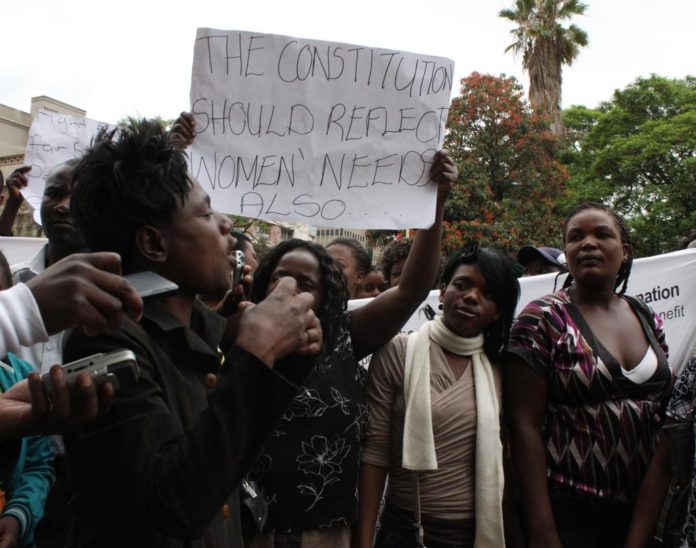HARARE — She said her husband choked her, pounded her with open fists, and knocked her head on the wall before grabbing a thick leather belt which he used to whip her.
Today, over 21 days after Zimbabwe embarked upon a lockdown against COVID-19, Tracy Mukwende, who is aged 41 years, said her husband is languishing in jail.
The 48-year old husband, Denis was found guilty of causing serious bodily harm and sentenced to three years in prison in the middle of Zimbabwe’s lockdown.
For Tracy and Denis, a lockdown that was meant to be a time to bond rather turned into a conflict that has landed the latter in jail.
“I couldn’t do anything to stop my husband from constantly attacking me during the lockdown; I tried to endure, but failed and ended up reporting him to police; he abused me over very minor issues — for instance on the day I reported him he had beaten me for not serving him supper on time,” Tracy told Ubuntu Times.

Yet, the two are not the only ones that have fallen apart during Zimbabwe’s lockdown.
There are ballooning cases of domestic violence as couples such as Tracy and Denis in Zimbabwe find more time together indoors, forced by coronavirus.
In less than two weeks into Zimbabwe’s initial 21-day lockdown, Musasa Project, a local non-governmental organization, said it had documented at least 782 cases of abuse compared to an average of 500 per month.
“We believe from the trends that we’re seeing that domestic violence is going to escalate,” said Rotina Musara, an advocacy program officer with Musasa Project.
Musasa Project concurs with the Women Coalition of Zimbabwe, a network of women rights activists and women’s organizations.
“As the lockdown continues we are concerned about the likelihood of an increase in gender-based violence (GBV) cases. At this stage GBV services need to be classified as essential services,” Ronika Mumbire, board chairperson of the Women in Zimbabwe Coalition, told Ubuntu Times.

A day before the expiration of Zimbabwe’s 21-day lockdown which begun on March 30, the country’s President Emmerson Mnangagwa announced a 14-day extension of the same saying the country had not yet met the World Health Organization benchmarks to warrant the lifting of a lockdown.
To couples confined in their homes by the marauding pandemic, the move has not been easy, resulting in many caught up in domestic conflicts.
Now, instead of fighting COVID-19, many Zimbabwean couples are fighting one another.
Catherine Mkwapati, a women rights defender and also director of the Youth Dialogue Action Network, a civil society organization here, said ‘arguments and conflicts are escalating among couples because they are living together 24 hours a day, forced to do so by the national lockdown.’
“You would realize that many men now confined indoors with their wives are not formally employed and because without income, they get angry when asked to make plans for the family’s food provisions, for instance, and this triggers violence,” Mkwapati told Ubuntu Times.
Even Musara of the Musasa Project, said ‘we have got young women who have been physically assaulted for asking for food to feed the family, especially in cases where the woman relies on the husband to provide food.’
With unemployment hovering above 90 percent in Zimbabwe, according to the Zimbabwe Congress of Trade Unions, most people are dependent on daily informal trade to earn a living.
But, amid the continuing lockdown, even dependency on informal trade for survival is no longer possible, and couples have to bear the brunt of hunger confined in their homes.

By the 23rd of April, Zimbabwe had 29 confirmed cases of COVID-19, with four deaths recorded since the disease pounced on the Southern African nation.
Coronavirus broke out for the first time end of last year in Wuhan, a city in Hubei Province in China, before it swiftly spread to several countries across the globe.
To Zimbabwean feminists like Musara, ‘as much as we say COVID-19 is an emergency, gender-based violence is an emergency as well.’
“Once gender-based violence is declared an emergency, at least we will have various actors coming together, sitting at the same table, and trying to come up with solutions to help especially women being victimized,” said Musara.
Priscilla Misihairabwi-Mushonga, a Zimbabwean legislator, said ‘I don’t necessarily agree with the fact that men are abusing women because they are confined; abusers have always been abusers.’
To many women rights defenders like Mkwapati, in Zimbabwe, ‘the lockdown is proving to be having far-reaching consequences because those who are in abusive relationships are now restricted face-to-face with their tormentors.’

Even as Zimbabwean police have said people can still report to them cases of domestic violence during the lockdown, many victims of domestic violence like 28-year old Mavis Chitoro have said ‘it is hard to call police when you are locked down in the same house with your abuser.’
Other gender activists such as Chelesile Nyathi of South Western Region Gender Network (SWRGN), a regional gender-focused network, said ‘when people spend more time together, chances are high that they start having multiple incidents of violence at home.’
To Nyathi, ‘when there is added stress in the home it increases the frequency and severity of abuse. This, in turn, creates greater risk of domestic violence.’
But, to Mumbire of the Women in Zimbabwe Coalition, hope is all they can embrace in the fight against domestic violence as the lockdown continues.
“With the now extended lockdown being in place, we are hoping that perpetrators of domestic violence will be brought to book,” said Mumbire.

